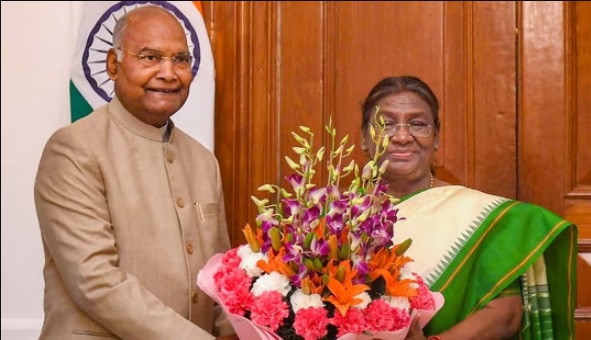
Key Recommendations on ‘One Nation, One Election’ by Ram Nath Kovind Panel
One Nation, One Election: The Kovind Panel Presents 18,626-Page Report to President Droupadi Murmu at Rashtrapati Bhavan”
On Thursday, a high-level committee chaired by former President Ram Nath Kovind presented its report on the viability of conducting synchronized elections for the Lok Sabha, state assemblies, and local bodies (commonly referred to as ‘one nation, one election’) nationwide. According to a statement, the committee submitted the report, which spans 18,626 pages, to President Droupadi Murmu at Rashtrapati Bhavan.
The report results from thorough discussions with stakeholders, experts, and research spanning 191 days since its establishment on September 2, 2023, the statement added.
In the presence of all committee members, including Union Home Minister Amit Shah, Union Law Minister Arjun Ram Meghwal, Democratic Progressive Azad Party (DPAP) chief Gulam Nabi Azad, and others, the Kovind committee presented the report.
The High-Level Committee recently convened and engaged with representatives from various political parties, including BJP, Trinamool Congress, Samajwadi Party, CPI, CPI(M), AIMIM, RPI, Apna Dal, and others.
The representatives of these parties also provided their suggestions to the committee in written form.
Restoring simultaneous elections: The committee emphasised the need to restore the cycle of simultaneous elections, which was disrupted after the initial decades of India’s independence. They noted that holding multiple elections every year places a significant burden on various stakeholders, including the government, businesses, workers, courts, political parties, candidates, and civil society.
Two-step approach: The committee recommended a two-step approach to holding simultaneous elections. In the first step, elections to the House of the People and State Legislative Assemblies should be synchronized. In the second step, elections to Municipalities and Panchayats should be synchronized with the elections to the House of the People and State Legislative Assemblies.
Notification by the President: The committee proposed that the President of India issue a notification on the date of the first sitting of the House of the People after a General election, designating it as the Appointed date for the synchronization of elections.
Tenure of state legislative assemblies: The committee recommended that the tenure of State Legislative Assemblies should end with the subsequent General elections to the House of the People after the Appointed date.
Implementation group: An Implementation Group should be constituted to oversee the execution of the recommendations.
Constitutional amendments: Certain amendments to the Constitution, including the introduction of Article 324A for simultaneous elections in Panchayats and Municipalities and amendments to Article 325 for a Single Electoral Roll and Single Elector’s Photo Identity Card, were proposed. These amendments would require ratification by the States.
Handling emergencies: In the event of a hung House, no-confidence motion, or any such event, fresh elections should be held to constitute the new House. Constitutional Amendment Bills would be introduced for necessary amendments without requiring ratification by the States.
Logistical planning: The Election Commission of India and State Election Commissions should draw up plans and estimates in advance for logistical arrangements, including the procurement of equipment like EVMs and VVPATs, and deployment of polling personnel and security forces.
Single electoral roll and identity card: Recommendations were made to amend Article 325 to enable the creation of a Single Electoral Roll and Single Elector’s Photo Identity Card, which would require ratification by the States.


